Bollywood Inquiry September 2019: CHHICHHORE, DREAM GIRL & THE ZOYA FACTOR
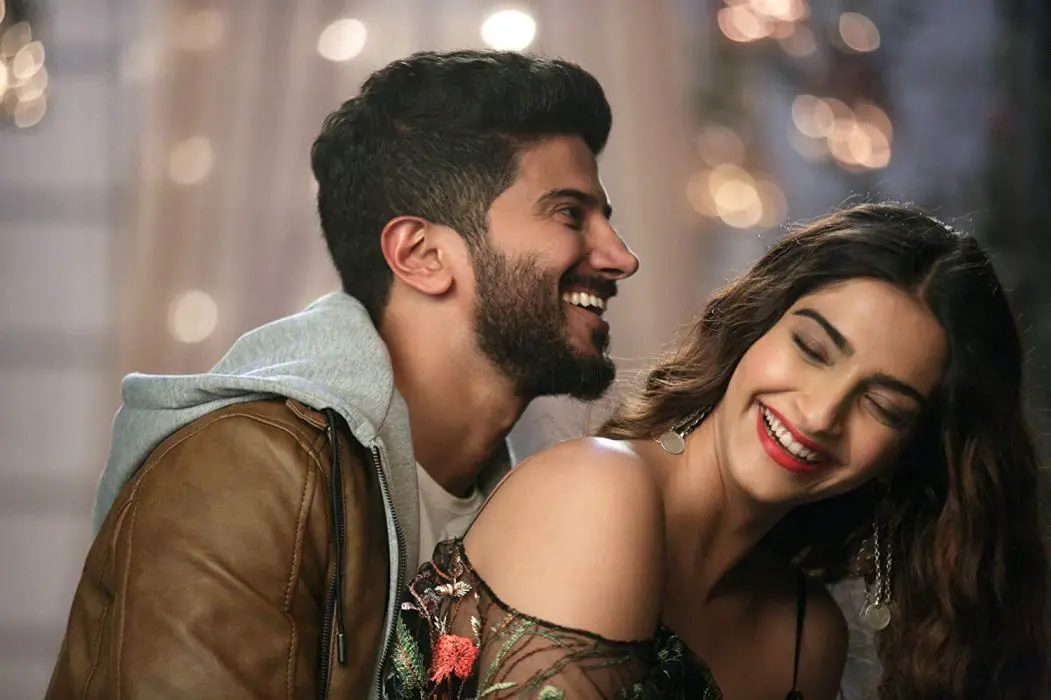
Musanna Ahmed is a freelance film critic writing for Film…
Bollywood Inquiry is a monthly column on the biggest new Bollywood movies. Disclaimer: I may not have seen all of the past month’s globally released features.
Chhichhore (Nitesh Tiwari)
It’s not unusual for a director to follow a massively successful film with a smaller passion project, utilising the increased commercial viability. A recent example is Taika Waititi‘s Marvel follow-up, the anti-hate satire Jojo Rabbit, which isn’t exactly a little indie flick but still probably cost less than the catering budget of Thor: Ragnarok. For Nikesh Tiwari, the expectations were lofty. His previous movie, the Commonwealth Games wrestling drama Dangal, wasn’t just a superhit – unadjusted for inflation, it stands as the biggest Indian movie of all time worldwide.
Tiwari‘s follow-up to Dangal, Chhichhore, is a much more modest venture in terms of scale, size and stars. This endearing dramedy is particularly interesting on a metatextual level, a drastically different film to Dangal in many ways. It’s basically an alternate take on the Big Chill format (or Return of the Secaucus Seven, if you want to be pedantic about the source of inspiration).
Old friends come together to reflect on college life but, rather than being brought together by a fellow classmate with unlimited potential (as in the Lawrence Kasdan classic), they’re brought together to guide a future student with unlimited potential after he attempts suicide.
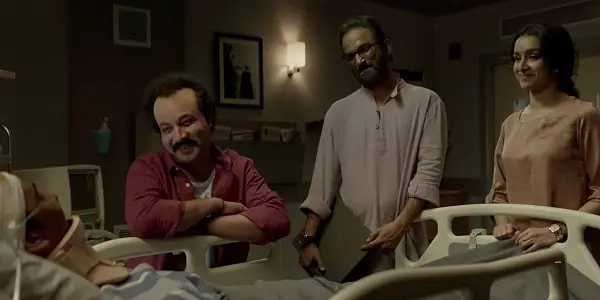
Gathering together in the hospital, Anni Pathak (Sushant Singh Rajput) and his old buddies narrate the times of hostel H4 – the college home of these self-described “losers” – to Anni’s son Raghav (Mohammad Samad), whose self-loathing has gone too far after his failure to be admitted into his top university choice.
Set in the 90’s, this college story has an innate resemblance to American Pie and other student-oriented movies of the time, particularly in the characterisations. The first of Anni’s friends to share his story with Raghav is the playboy Sexa (a nickname, of course). He’s played by Varun Sharma, whose peculiar face could point to a whole career as a funnyman if he didn’t display a surprising level of emotional intelligence as the horny socialite of H4.
Up next in the chaptered character exploration is the acid-tongued Acid (Naveen Polishetty), who has a chip on his shoulder for the professors that failed him after a promising academic start. It’s a chicken and egg situation for his behaviour but Anni’s intrinsic leadership qualities help Acid unlock his potential.
In fact, Anni facilitates the development of every one of the mischievous lot, which also includes the alcoholic Bevda (Saharsh Kumar Shukla), star athlete Derek (Tahir Raj Bhasin) and Mummy (Tushar Pandey), a sheltered guy nicknamed after his favourite word for help. Plus, like every bro culture flick, there’s a gorgeous girl at the centre. That’s Maya (Shraddha Kapoor), the most level headed individual in the vicinity whom we know will end up as Anni’s significant other, heading hand-in-hand to the hospital for their son in the wraparound narrative.
Anyone accustomed to Bollywood knows to expect an interval, the use of which can affect the entire vision: narratively, tonally, atmospherically. It can turn a comedy into a melodrama, a sci-fi romance into a full-blown action movie, dividing a film from a whole into two clear-cut halves.
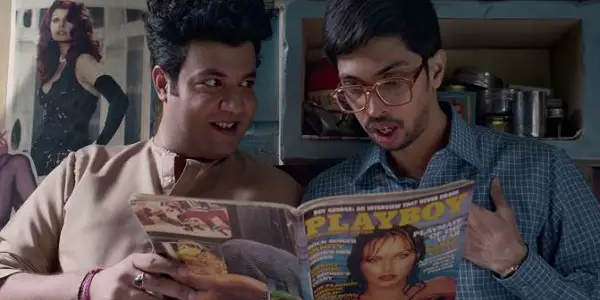
In the post-interval period, Chhichhore moves on from frat boy comedy to sports entertainment and succumbs to formulaic athlete tropes when the full focus is on the General Championship, a multi-sports competition with each hostel as participant and their reputations on the line. Furthermore, the humour gets a little bit silly later on, almost flanderizing the characters before a few smart choices save them at the last second.
Essentially, the director has made another film about sports but one with a markedly different subtext. In Dangal, the family of wrestlers are elite level, becoming greats thanks to a rigid and rigorous training structure set by the father (played sternly by globally renowned star Aamir Khan, in contrast to the mostly unestablished faces that make up this film’s ensemble), who moulds his prodigal daughters into champions via an uncompromising process of development.
Here, the director scrutinises his own notion of how to succeed by challenging the meaning of hard work, suggesting that hard work is born out of hard play, as the key to sports success isn’t the hours spent in the gym or the field but rather the strong camaraderie born out of silly dorm antics.
Shamefully, Maya has almost no arc in the movie, underserved in both halves. Her character has the most outstanding hook – one of the only female students on their engineering course – but ultimately her existence amounts to little more than the pretty women that completes Anni’s life.
The one scene where she gets to do something besides covert or overt companionship for her man is when Sexa employs her to prank call an opposing player and keep him up all night with dirty talk to wear him out before a big game. Nevertheless, Kapoor rises way above the occasion.
Savvy hair and makeup work saves the filmmakers from recasting any of the roles; the work is noticeable yet suitable, handing the performers a realistic prophecy of how their hairlines will end up. Huge credit goes to casting directors Rachita Kapoor and Mukesh Chhabra, whose keen eyes picked actors able to swiftly transition between twenty years, thanks to the physical dimensions of their acting talents as well as the work of cosmetologists.
The power of storytelling can’t be underestimated – God knows that this movie could save an impressionable kids’ life like how listening to the joys of college life saves Raghav, who fears the worst for his future after he doesn’t get the grades. He needs to hear that good times are promised ahead no matter which college he ends up in and, likewise, we could do with some reassuring optimism through cinema. It may be a film about losers but Chhichhore is a winner.
Dream Girl (Raaj Shaandilyaa)
Dream Girl is hilariously low stakes and largely a one-joke movie yet it’s still better than most recent mainstream Hindi comedies. It’s all thanks to Ayushmann Khurrana – continuing a seemingly endless winning streak of leading performances, he delivers as shrewdly as ever, even when the act demands caricature.
A small town’s sex call centre goes into disarray when employee of the month winner Pooja inexplicably goes AWOL. Unemployed Karam Singh (Khurrana) is desperate to find work and sees an opportunity to fill the void left by Pooja by literally reclaiming his voice, as the movie begins with a flashback wherein the kid protagonist is mocked for his high pitched vocals. Against the wishes of his father and the director of the call centre, Karam grabs the phone and applies the gift of his gab, winning over the customer with Pooja’s sultry, sweet voice.
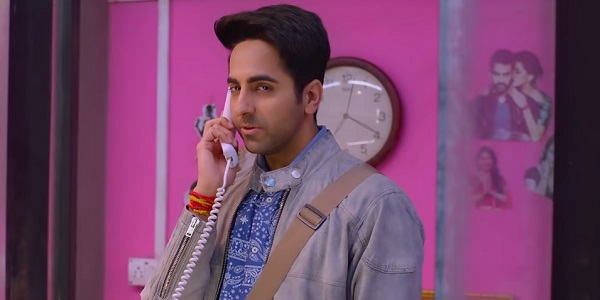
The words emanating from his seductive tone are an immediate weakness for the town’s locals, though it’s quite unusual that the fake Pooja’s service is revelatory when the real woman is already implied to be a top dog for the call centre.
Fake Pooja ropes in some regular customers – a hip youth nicknamed Toto (Raj Bhansali, no connection to the Padmaavat director) who thinks he’s too cool for his mum, Karam’s staunchly celibate friend Mahinder (Abhishek Banerjee), and his own father (Annu Kapoor), a widower who’ll do anything for love – more on that later. As for the lead character, his own eyes are set on Mahinder’s feisty sister Mahi (Nushrat Bharucha).
There are deeper ideas in Dream Girl such as the identity rifts created in inter-religious relationships, and contemporary interpretations of masculinity and femininity, but the straws I need to grasp for conclusions are out of reach. Ultimately, the film remains at surface level when presenting such topics, packaging them tightly for mainstream entertainment value, giving the social message little room to survive.
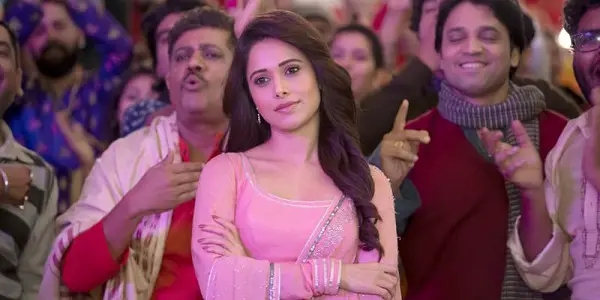
Khurrana operates at a sensible register, delivering a dual-layered performance as both the male character and the female character within the male character. He pitches Pooja perfectly – you can understand why the owners would continually exploit Karam’s success despite the risks as the actor never goes over the limit of mimicking a call girl, playing down the script’s high innuendo.
He’s so head and shoulders above the rest of the cast that he probably directed himself. Though, Annu Kapoor is arguably the most fun to watch, particularly once he does anything to impress Pooja, thickly applying mehndi on himself and speaking Urdu, an inoffensive stereotype of a Muslim man enthralled by a woman, after his desire to meet Pooja is fulfilled by his son donning a veil, feigning to be a religiously observant lass.
I’m surprised I liked Dream Girl so much considering it didn’t offer me much to think about – unusual for a film starring Khurrana – but it’s easy to imagine any other of his contemporaries making a mess of the role and, in turn, the entire movie. For this terrific actor, it’s simply an exercise of his versatility.
Sometimes, all a film needs is a strong performance to be enjoyable, though the candy-coloured escapism offered in the undemanding Dream Girl will help on a bad day. The central conceit is not a romantic arrangement you’d want to be in but it’s fun to watch the locals tripping over themselves to attain a fantasy.
The Zoya Factor (Abhishek Sharma)
The pneuma of Garry Marshall, the irresistible appeal of Mills & Boon, the artificial allure of a Coco Chanel advert – these jewels are embedded in the storytelling of The Zoya Factor, a cute romcom with unexpected depth.
The budget for this mid-range feature appears to have been entirely financed by product placements – Asics, Dairy Milk, Yeezy, Bape, Pepsi, etc. The soft drink plays a prominent part of the narrative as the protagonist Zoya Solanki (Sonam Kapoor) is a junior copywriter at a top-level ad agency and the Coca Cola alternate is host to her new assignment.
Zoya hates cricket. She hates hearing the competitive squabbles about the sport between her brusque brother and less brusque father (played by the leading actresses uncle Sanjay Kapoor, a casting that only reinforces the nepotism charge that Sonam has dealt with her whole career). With a deeply self-deprecating outlook to life – particularly following a break-up with a dentist punching way above his weight – Zoya’s bad luck reaches the pits when the Pepsi job entails shooting an advert with the Indian cricket team in the run-up to the World Cup.
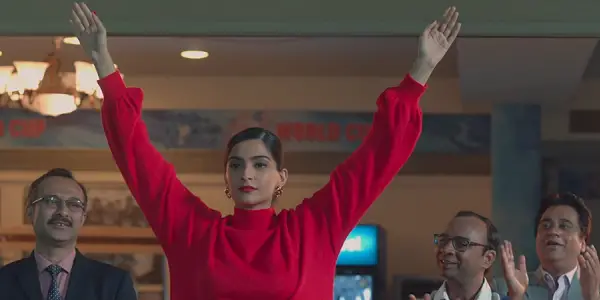
Falling for the team’s hardworking captain Nikhil Khoda (Dulquer Salmaan) at first sight, Zoya is enthusiastic about hanging out with the team and, over a group meal, she speaks of being the apotropaic baby of her cricket-loving household as she was born on the day in 1983 when India won the World Cup. Thanks to the details of her background, she succeeds in an unofficial application to be the team’s lucky mascot, a role she cares less about than the people who could benefit from it – specifically, the attractive captain, who doesn’t really believe in luck.
In the upcoming match, some cricketing mistakes are immediately nullified in mysterious ways, and the players who believe in superstition chalk it down to the fact that they had breakfast with Zoya, their lucky charm. From there on, she’s regularly invited to hang out with the cricketers – despite the skepticism of the captain – and their luck increases extraordinarily, benefitting from no-balls and failed catches by the opposition whenever the prospect of winning is dire.
A man with dearly scrupulous tenets, Nikhil Khoda repels the idea that the team is achieving victories because of one woman but Zoya’s credulity gives the idea some credibility, convincing him to mate with her for some reason. I mean, just look at them – they’re both so good looking that the whole idea of persona or character doesn’t even need to be established to lend credence to the fact that they have sexual chemistry.
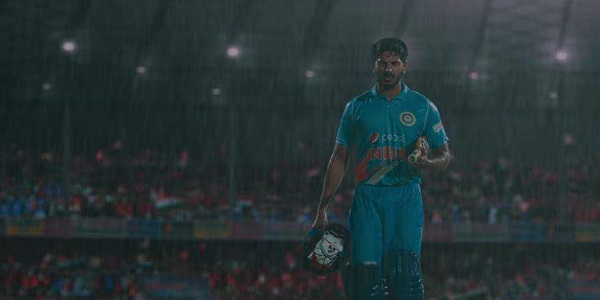
As Zoya solitics more time with Nikhil due to the good luck she brings to the team, Kapoor rubs off her charm on her leading man Salmaan. He smirks for 80% of his performance, corpsing at the outsized delights brought to set by his endearing co-star. The role is a walk in the park for Kapoor, an extension of her similarly ditzy character in the Disney-distributed Khoobsurat, which is absolutely this film’s progenitor in every way.
However, for us to enjoy watching Kapoor do her shtick would require a tolerance for the type of romantic leading lady role that died about the same time Matthew McConaughey left them, before films like The Big Sick, Ruby Sparks and Crazy Rich Asians turned the genre on its head with subversion, self-awareness and consciousness of the current times.
Therefore The Zoya Factor does feels dated in some ways, making it all the more surprising when it presents thematic depth. When an all-male cricket board officially selects Zoya as their lucky mascot for the World Cup, they lay out terms for her on what and what not to say or do in the public eye, creating a suffocating, dangerously patriarchal environment that any ambitious woman may have traversed through, like an actress dating a successful CEO or a woman in engineering.
The filmmakers never present Zoya’s new circumstances, which also includes literal deification, as awfully as it can be in real life but part of the movie’s odd success is wrapping the theme of the exploitation of women in a safe, family-friendly package, allowing the film to get its message through in a direct yet wholesome way. That said, the lack of edge pushes the film closer to broad cliché than subdued social commentary, completing its narrative and character arcs at an unfortunately familiar place, unable to take complete advantage of a powerful foundation.
With a frothy movie like this one, Sonam just wants to have fun. She can do better, as evidenced in films like Neerja and the groundbreaking Ek Ladki Ko Dekha Toh Aisa Laga. The director can do better; showing greater promise when he spoofed Bin Laden in a cleverly satirical debut. The industry could offer better romantic fare and, as viewers, we can do better than to indulge in cinematic comfort food. But can’t we just have some cake on occasion? I certainly have time to relish a sweet 90’s throwback, particularly as we approach the typically darkness-induced awards season.
Next Month
And that concludes the September 2019 edition of Bollywood Inquiry! October has a lot to offer, including a biopic on octogenarian sharp shooters (Saandh Ki Aakh), the new entry in a hit comedy franchise (Housefull 4), a supernatural thriller imaginatively entitled Ghost, an action thriler equally imaginatively entitled War and Priyanka Chopra‘s long-awaited return to Hindi cinema with The Sky is Pink, for which the trailer is attached below. Stay tuned for the next month’s column and read previous Bollywood Inquiry editions here.
Which Bollywood films are you looking forward to this year or have enjoyed so far? Let us know in the comments.
Does content like this matter to you?
Become a Member and support film journalism. Unlock access to all of Film Inquiry`s great articles. Join a community of like-minded readers who are passionate about cinema - get access to our private members Network, give back to independent filmmakers, and more.
Musanna Ahmed is a freelance film critic writing for Film Inquiry, The Movie Waffler and The Upcoming. His taste in film knows no boundaries.













